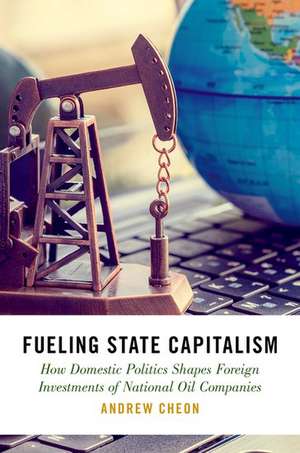Fueling State Capitalism: How Domestic Politics Shapes Foreign Investments of National Oil Companies: STUDIES COMPAR ENERGY ENVIRON POL SERIES
Autor Andrew Cheonen Limba Engleză Hardback – 24 mai 2023
Preț: 339.43 lei
Preț vechi: 467.66 lei
-27% Nou
Puncte Express: 509
Preț estimativ în valută:
64.96€ • 67.57$ • 53.63£
64.96€ • 67.57$ • 53.63£
Carte disponibilă
Livrare economică 13-19 martie
Livrare express 07-13 martie pentru 86.75 lei
Preluare comenzi: 021 569.72.76
Specificații
ISBN-13: 9780197672884
ISBN-10: 0197672884
Pagini: 200
Dimensiuni: 239 x 162 x 17 mm
Greutate: 0.44 kg
Editura: Oxford University Press
Colecția OUP USA
Seria STUDIES COMPAR ENERGY ENVIRON POL SERIES
Locul publicării:New York, United States
ISBN-10: 0197672884
Pagini: 200
Dimensiuni: 239 x 162 x 17 mm
Greutate: 0.44 kg
Editura: Oxford University Press
Colecția OUP USA
Seria STUDIES COMPAR ENERGY ENVIRON POL SERIES
Locul publicării:New York, United States
Recenzii
In Fueling State Capitalism, Andrew Cheon rightly focuses our attention on a crucial part of the global economy: national oil companies. Over the past two decades, these state-owned enterprises strode forth from China, Russia, and elsewhere, with political and economic effects all over the world. Cheon gives us a guide for understanding these developments.
In a world in which fossil fuels continue to be understood as the economic commanding heights, Fueling State Capitalism shows how political institutions shape the investment choices made by national oil companies. Cheon also provides us with a lens for understanding how these crucial economic actors are grappling with climate change. Highly recommended.
Fueling State Capitalism is a brilliant and meticulously researched work, offering insights from the foreign activities of national oil companies (NOCs) in contexts as diverse as Brazil, China, India, Norway, and Russia. It is sure to change the way we think about the international behavior of state-owned enterprises and, more generally, how we think about bureaucratic competition and authority in state capitalist societies.
What role do state-owned enterprises (SOEs) play in a global capitalist economy? Can SOEs aid governments in securing their energy needs in a world undergoing a major energy transition? With a novel argument and data, Cheon casts doubt on whether such national oil companies (NOCs) can help governments pursue 'resource diplomacy' because of the domestic political constraints they face. Achieving energy security may require rethinking how NOCs operate.
National oil companies have long been significant players in domestic fossil fuel production. Developing a tightly woven argument about bureaucratic structures, Cheon explains the conditions under which national oil companies choose to invest abroad, with particular attention to China, India, Brazil, Norway, and Russia. Fueling State Capitalism is set to be a valuable contribution to the field of international energy politics, especially as countries begin to ponder decarbonization strategies.
In a world in which fossil fuels continue to be understood as the economic commanding heights, Fueling State Capitalism shows how political institutions shape the investment choices made by national oil companies. Cheon also provides us with a lens for understanding how these crucial economic actors are grappling with climate change. Highly recommended.
Fueling State Capitalism is a brilliant and meticulously researched work, offering insights from the foreign activities of national oil companies (NOCs) in contexts as diverse as Brazil, China, India, Norway, and Russia. It is sure to change the way we think about the international behavior of state-owned enterprises and, more generally, how we think about bureaucratic competition and authority in state capitalist societies.
What role do state-owned enterprises (SOEs) play in a global capitalist economy? Can SOEs aid governments in securing their energy needs in a world undergoing a major energy transition? With a novel argument and data, Cheon casts doubt on whether such national oil companies (NOCs) can help governments pursue 'resource diplomacy' because of the domestic political constraints they face. Achieving energy security may require rethinking how NOCs operate.
National oil companies have long been significant players in domestic fossil fuel production. Developing a tightly woven argument about bureaucratic structures, Cheon explains the conditions under which national oil companies choose to invest abroad, with particular attention to China, India, Brazil, Norway, and Russia. Fueling State Capitalism is set to be a valuable contribution to the field of international energy politics, especially as countries begin to ponder decarbonization strategies.
Notă biografică
Andrew Cheon is Assistant Professor of International Political Economy at Johns Hopkins SAIS. His research covers state capitalism, rising powers, coercive diplomacy, energy security, and environmental conflict. He was previously the founding President of Duke East Asia Nexus, an academic journal. His work appears in outlets such as Economics and Politics, Comparative Political Studies, Journal of Conflict Resolution, Political Studies, Global Environmental Change, and Energy Policy. He is also co-author of Activism and the Fossil Fuel Industry.



